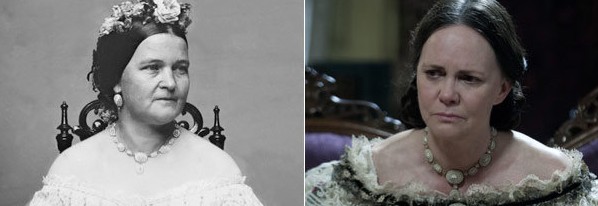
Like many of you I am looking forward to seeing Speilberg’s film, Lincoln. There is quite a buzz, which I hope translates into a good showing at the box office. As long as we don’t get carried away with critiquing the film along the narrow lines of historical accuracy we should be just fine. I am hoping Daniel Day-Lewis presents us with a sympathetic portrayal of Lincoln that is placed within a solid historical context. I am not looking for nor do I desire a scholarly treatment of Lincoln. First and foremost, I want to be entertained. I plan on writing a review for the Atlantic and I have agreed to take part in a roundtable discussion that will appear at some point in the journal, Civil War History.
I am also looking forward to seeing what Sally Field does with Mary Todd. If anyone deserves a sympathetic treatment it’s Mary Todd and after listening to Field reflect on her character I am confident that this is just what we will see. It would have been easy to present the popular view of an unstable woman, who caused her husband nothing but trouble. Remember Mary Tyler Moore in the TV adaptation of Gore Vidal’s Lincoln? This is still a common theme in the Lincoln literature as well. Back in 2007 I taught an elective on Lincoln, which included a couple of classes on Mary Todd. Students examined a number of secondary sources including an essay by Jean H. Baker in which she offers her own interpretation of why this particular view continues to hold sway.
Kevin,
Jason Emerson (the Madness of Mary Lincoln), Daniel Mark Epstein (The Lincolns), and Catherine Clinton (Mrs. Lincoln), have all done very good work on the first lady recently.
I don’t remember who mentioned it, but one of them, in our Virtual Book Signing™ interview, confirmed Andy’s finding that the term “Mary Todd Lincoln” only came in to use later, and almost certainly after her death. I also recall a suggestion that the “Todd” construction was popular among the “Herndon” faction of Lincoln memory, and used in the context of the Ann Rutledge story – that Rutledge was Abraham’s first and ONLY love. In the world of the early 20th Century, making Mary a “Todd” labeled her as crazy, and also removed her a step from the family that included her husband. Her self-definition seems to have included little identification with her family of origin, and intense loyalty to the family she created with Mr. Lincoln.
Incidentally, do you know whether Mrs Lincoln was ever referred to as Mary Todd Lincoln in her lifetime? I haven’t been able to find out when the American custom of including in a married woman’s name the surname of her father (eg Jaqueline Bouvier Kennedy) or previous husband (eg Jaqueline Kennedy Onassis) originated.
Good question. No off hand I don’t, but hopefully someone else will have the answer.
I did a quick Ngram of it (something Kevin showed me, BTW), and it doesn’t start showing up in books until well after the assassination, and didn’t become commonplace until the early 20th century. A quick scan of a couple of newspaper indices shows the same thing — “Mary Todd Lincoln” starts appearing in print around 1875-80 (-ish).
Thanks, Andy.
Hope the PhD-enabled will resist the temptation to pass over to a Nerdvana of nitpicking.
I have no doubt that some will use the opportunity to point out every which way the movie falls short of the history. As a history teacher I am more interested in figuring out how I can use it in class alongside other sources and as a means to spark interest.